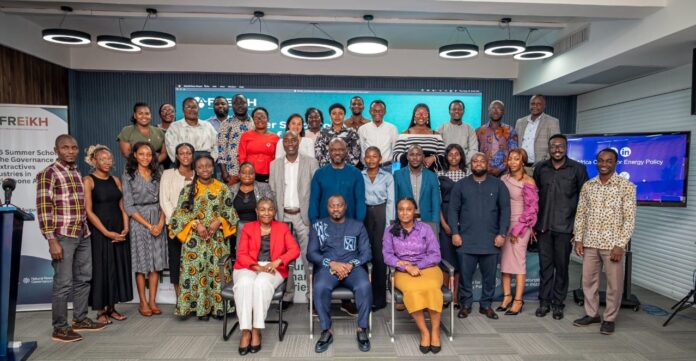By: Christian Kpesese
Participants of the just-ended Africa Regional Extractive Industries Knowledge Hub (AFREIKH) 2025 Summer School have pledged to return to their countries as champions of reform in extractive sector governance, energy transition, and sustainable development.
The ten-day residential programme, held from August 19-28, 2025 hosted in Accra by the Africa Centre for Energy Policy (ACEP) in partnership with the Natural Resource Governance Institute (NRGI), brought together young leaders from different backgrounds including, policymakers, researchers, media and civil society actors from across Anglophone Africa.
The 2025 AFREIKH Summer school equipped participants with practical strategies to influence policy, advocacy, and innovation in the governance of Africa’s extractive resources in the wake of global shift from dependence on hydrocarbon to renewable sources of energy.
Some Key Takeaways
Participants agreed that energy remains the bedrock of development, stressing that Africa’s progress depends on securing reliable, affordable, and inclusive energy, particularly in the era of global transition.
The Extractive Industries Ambassadors underscored the urgency for African governments to scale up investments in clean energy, methane abatement, and renewable technologies, describing the transition as “a development pathway that must be just and inclusive.”
The summer school further highlighted:
- Value addition as a necessity, not a choice: Africa’s mineral wealth must fuel industrialisation, job creation, and development rather than raw resource exports.
- Critical minerals for Africa’s future: While essential to the global north, participants stressed their strategic role in Africa’s own transformation.
- Financing the transition: With Africa requiring about $500 billion to close its energy gap but having access to only $22 billion, innovative financing, stronger public-private partnerships, and transparent governance are imperative.
- Political economy and inclusion: Extractive governance must recognise power dynamics, promote resource redistribution, and meaningfully engage local communities.
- Technology and knowledge transfer: Building local capacity and leveraging indigenous knowledge were identified as vital for Africa’s transition agenda.
Quoting Dr Olufunso Somorin of the African Development Bank, one of the resource persons, participants were reminded to “look at minerals as a seed, not as bread,” underscoring the importance of long-term development over short-term gains.
Shared Aspirations
The 2025 cohort pledged to become agents of change by:
- Promoting peer-to-peer learning and advocacy for reform.
- Producing fact sheets to increase public awareness.
- Ensuring women and vulnerable groups are represented in decision-making for a just transition.
- Advocating to ensure that, mining is not just exploitation of minerals but linked to development.
- Championing transparency, innovation, and inclusive governance across divides.
As Executive Director of ACEP put it: “If you have to work with your enemy for results, do it, for the interest of Africa.”
In their closing reflections, participants acknowledged that Africa’s challenge lies not in the availability of resources but in how they are governed and redistributed.
With renewed knowledge and determination, the graduates of AFREIKH 2025 are returning home with a clear mission: to redefine Africa’s extractive sector for the benefit of its people and ensure the continent is not left behind in the global energy transition.
A total of 27 individuals selected after a competitive process from civil society groups, academia, media, anti-corruption agencies, and the natural resource and environmental governance sectors participated in the event. They represented Ghana, Nigeria, Zimbabwe, Kenya, Madagascar, Uganda, Sierra Leone, Mauritania, Tanzania, among others.
The writer, Christian Kpesese is the Managing Editor of www.naturalresourcesnews.com and a participant at the 2025 AFREIKH Summer School.



